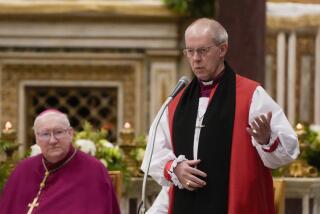Swiss Banks Setting Up Victims Fund
- Share via
PARIS — The biggest Swiss banks--increasingly under fire at home and abroad for their role in World War II, when neutral Switzerland had vast business dealings with Nazi Germany--announced Wednesday that they are setting up a $70-million fund to assist victims of the Holocaust.
The decision comes after months of criticism over alleged Swiss foot-dragging in tracking down dormant accounts belonging to Jews and others killed in the war. There also has been a mounting controversy over Switzerland’s wartime purchases of gold that the Nazis had plundered from occupied countries and may have extracted from the teeth of death camp inmates.
Bowing to international pressure, the three banks--Credit Suisse Group, Union Bank of Switzerland and Swiss Bank Corp.--said “the time has come for action, not words.”
The banks said they will set up an escrow account of 100 million Swiss francs, or about $70 million, to be named “The Humanitarian Fund for the Victims of the Holocaust.”
“Now it is up to the government to decide the form and the purpose of the fund,” the banks said in a statement. “The account is open for further donations, including some from the Swiss National Bank and the government.”
Swiss diplomat Thomas Borer--who heads a special task force set up by the Swiss government to negotiate an end to the dispute with international Jewish organizations and other critics such as Sen. Alfonse M. D’Amato (R-N.Y.)--said he hoped the banks’ gesture would calm the atmosphere.
“I’m very happy,” Borer said in a telephone interview from Bern, the Swiss capital. “It should take the pressure off Switzerland and show our good faith to do what’s necessary. If that doesn’t happen, I’ll wonder what’s going on.”
In New York, D’Amato, chairman of the Senate Banking Committee, described the banks’ move as “an important first step in dealing with this tragic, disgraceful period.” He called it “a breakthrough, an acknowledgment of the wrongdoing.”
Edgar Bronfman, president of the World Jewish Congress, said of the fund: “We look forward to this development as marking a new chapter in our relationship.” And Israeli Foreign Ministry spokesman Effi Ben-Matityahu observed: “The move indicates a right direction toward a humanitarian solution to this whole issue.”
Rainer E. Gut, chairman of Credit Suisse, suggested last month that a fund--proposed last year by world leaders of Jewish organizations as a goodwill gesture--be started immediately as Switzerland was facing its worst “credibility crisis” since World War II.
Numerous European countries, including Spain, Sweden, Portugal and France, have recently begun reassessing their wartime actions and dealings with Adolf Hitler’s Germany. But nowhere has the process been so agonizing and controversial as in Switzerland, which has been accused of exploiting its wartime neutrality to act as the Nazis’ banker and money launderer.
In December, the outgoing Swiss president provoked a storm of controversy by accusing international Jewish organizations of attempting to “blackmail” his country. Last month, the Swiss ambassador to Washington, Carlo Jagmetti, tendered his resignation after a confidential cable he sent home referring to Switzerland’s “war” with its adversaries was reprinted in a Swiss newspaper.
Some politicians in New York last week proposed a ban on local government transactions with Swiss banks, and Jewish organizations have threatened to call for a boycott on doing business with them.
A class-action lawsuit, backed by the Los Angeles-based Simon Wiesenthal Center, has been brought in U.S. courts against the Swiss banks to force them to turn over all assets of individuals who died in the Holocaust.
In announcing the victims fund, the banks expressed the hope that it would promote a more cooperative spirit in the negotiations.
“The banks trust that this initiative will clear the way for the Swiss government, Switzerland’s business and financial community and Jewish organizations to work together toward finding a just and equitable solution,” the financial institutions said.
Christophe Meier, a spokesman for Credit Suisse, acknowledged in a telephone interview from the bank’s home office in Zurich that “the banks had to act quickly. We think it’s time for a goodwill gesture.”
The fund, the banks said, does not affect the ongoing search for dormant accounts that may belong to victims of the Holocaust. Last year, a survey by the Swiss Bankers Assn. turned up about $30 million in such accounts. But Jewish organizations contend that the banks still contain as much as $7 billion in savings accounts of slain Jews and in gold, artwork and other assets pillaged by the Nazis.
Former Federal Reserve Chairman Paul Volcker chairs a commission created by the Swiss banks and international Jewish organizations to identify accounts left by Holocaust victims. He told a news conference in Zurich last week that the commission has identified only “the tip of the iceberg.”
Last week, Stuart E. Eizenstat, U.S. undersecretary of commerce for international trade and the special State Department envoy for restitution of stolen property in Eastern and Central Europe, visited Switzerland to assure the Swiss that the United States is not, in his words, part of a “vendetta” against the Swiss banking system.
But he also urged them to make a conciliatory gesture to show that they are sincere about restoring plundered property or the savings of Jews who perished in the Holocaust.
More to Read
Sign up for Essential California
The most important California stories and recommendations in your inbox every morning.
You may occasionally receive promotional content from the Los Angeles Times.













